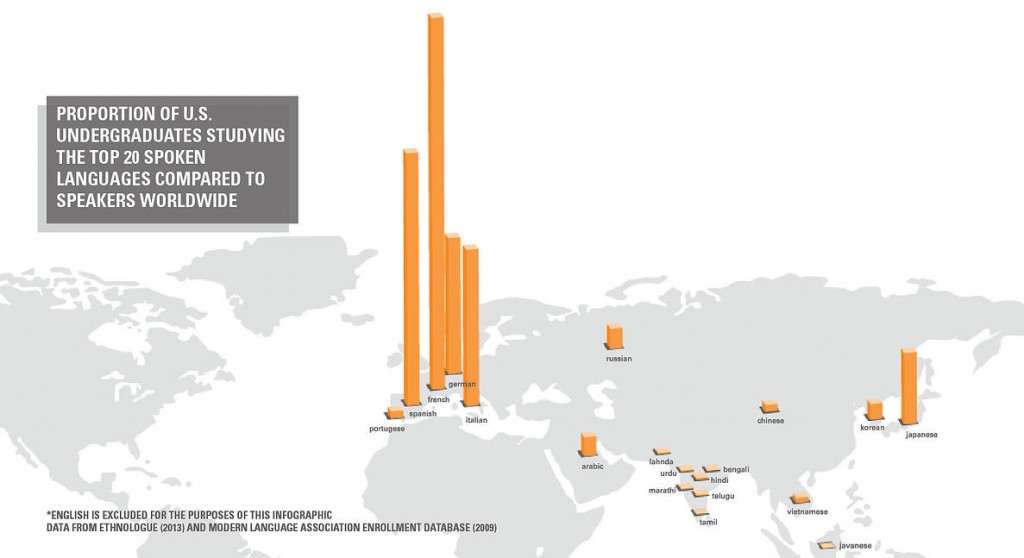
“Proportion of U.S. undergraduates studying the Top 20 spoken languages compared to speakers worldwide.” Source: Student Language Exchange. (Click to enlarge)
The above infographic is highly informative: Given the amount of individuals who actually speak a living language, the number of U.S. students currently studying those languages may be completely disproportionate. Clearly this is the case of French, which, for historical and geographic reasons, has been Americans’ and other native Anglophones’ foreign language of choice par excellence (no pun intended) for centuries. But, in reality, only about 1.07% of the world’s population speaks French as a first language (Ethnologue 2014).
Especially in the case of the United States, Spanish also makes logical geopolitical sense to study and master. However, with 414,170,030 speakers worldwide (as opposed to French’s “only” approximately 75 million (Ibid.)), the prevalence of Spanish-language students makes more sense numerically. Still, statistics like those provided by the Student Language Exchange show that U.S. universities are neglecting huge populations and markets by only focusing on the old standbys.
Portuguese is one such example. While Portuguese has certainly been an important world language throughout the last 500 years, many Americans and English speakers in general may not have considered it as a worthy focus of their attention. Until now.
In a recent interview, Edleise Mendes, President of the Sociedade Internacional de Português Língua Estrangeira (SIPLE, the International Society of Portuguese as a Foreign Language), reports that, in the last ten years, interest in studying Portuguese as a foreign language throughout the world has tripled (Neves 2014). She notes that rising interest in China and the United States reflects a worldwide reawakening to the practicality of studying this language.
Of course, one would be quite remiss in omitting the vast influence that Brazil has had in swaying this surge in interest. In fact, and staying within this article’s parameters of “language by the numbers,” approximately 95% of worldwide Portuguese speakers (of a total approaching 210 million) live in Brazil (Ethnologue and CIA World Factbook 2014).
An enormous nation (the sixth most populous in the world) comparable in both territorial and population size to the United States, Brazil’s diversified economy has grown to the point that its is now primed to be one of the leading markets of the 21st century: “Exploiting vast natural resources and a large labor pool, it is today South America’s leading economic power and a regional leader, one of the first in the area to begin an economic recovery” (Ibid.). What’s more, Brazil’s image as a fun-loving, culturally rich patchwork nation of many nuances is a huge part of its worldwide appeal.
For more information regarding how you can study the Portuguese language and all of its many “ports of call” at the University of Illinois (and beyond), check out this LibGuide. The Latin American and Caribbean Studies Collection at the University Library is also a fantastic starting point and resource, along with the reference collection at the International and Area Studies Library.

Map of nations where Portuguese is an official language.
References
_____. (2014). “Brazil.” CIA World Factbook. Web. Accessed 11 December 2014. https://www.cia.gov/library/publications/the-world-factbook/geos/br.html
_____. (2014). “French.” Ethnologue. Web. Accessed 10 December 2014. http://www.ethnologue.com/language/fra
_____. (2014). “Portuguese.” Ethnologue. Web. Accessed 11 December 2014. http://www.ethnologue.com/language/por
_____. (2014). “Spanish.” Ethnologue. Web. Accessed 11 December 2014. http://www.ethnologue.com/language/spa
Neves, Patrícia. (2014). “Português gera interesse mundial ‘nunca visto’.” Plataforma Macau. Web. Accessed 11 December 2014. http://www.plataformamacau.com/macau/portugues-gera-interesse-mundial-nunca-visto/

